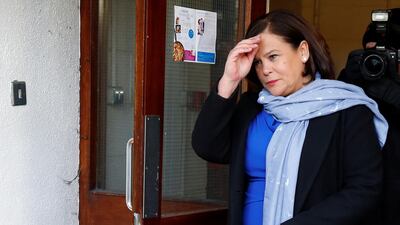Sinn Fein appears set to make a historical breakthrough in Ireland’s general election on Saturday after seeing a surge in support as country swings away from traditional parties
The leftist, nationalist party of reunification is the largest across Ireland, whether in the Irish republic or in the British jurisdiction of 6 counties known as Northern Ireland, where it is part of a devolved government.
However Sinn Fein has had only a minor role in the republic since the 1920s. The reason is the party’s historical association with the paramilitary Irish Republican Army, and because the Republic’s politics have been dominated by two centre-right parties, Fianna Fail and Fine Gael.
But post-Brexit, Sinn Fein’s republicanism is tapping into a new, inclusive patriotism among a generation who remember little or nothing of Ireland’s 30-year urban conflict, rooted mainly in Northern Ireland, or the IRA and Sinn Fein's association with them.
Ahead of the election, the party has been calling for a united Ireland to reap the economic benefits arising from Britain’s departure from the European Union. It has called for a unity referendum and a governmental committee to publish a white paper on unification.
It is not unification alone that is driving the surge in Sinn Fein’s popularity. Record-high rents and property prices, lengthy waiting lists for social housing, stressed social services, homelessness and rampant inequality have left Europe’s youngest population disaffected with Fianna Fail and Fine Gael.
While Fianna Fáil says it would build 50,000 affordable homes and 50,000 social housing units, the youth vote and even the 35-55 age electorate, don’t want more socially conservative policies, and haven’t forgotten how Fianna Fáil led Ireland into a financial crisis in the Great Recession.
Fine Gael said it would expand its Help-to-Buy scheme to help more people to buy their first home. This scheme has been highly criticised as out-of-touch for the common Irish wage.
The younger, more progressive generation that has emerged after years of austerity mostly refuses to inherit the tribal party affiliations of their parents and is looking to the left. They want what the “Shinners” are selling: “an egalitarian republic and a reign of social justice for the Irish people”.
Sinn Fein could solidify a leftist bloc in Irish politics with its democratic socialist platform. At a time when luxury projects are under construction and privately owned homes remain vacant but off the market, the party is proposing to initiate the republic’s biggest ever public housing programme and build 100,000 homes in five years, including affordable housing,
It wants to reduce rents by up to €1,500 (Dh6,000) a year and freeze prices for three years, while giving the central bank powers to cap mortgage interest rates.
Sinn Fein’s manifesto seeks to tackle what many Irish see as an insurance-company monopoly, and eliminate a social charge on salaries, a tax on housing and end university fees.
These costs were introduced through austerity measures under Fine Gael.
Sinn Fein has promised to return the retirement age to 65 and prohibit mandatory retirement, and wants to end a recruitment ban in the Irish health service, open 1,500 new beds, hire 2,500 more nurses and midwives, 1,000 more doctors, and drastically increase home help hours.
The party also promises to increase police numbers, more funding for the courts and public prosecution, and create a sentencing council to ensure punishments match the crime.
Sinn Fein’s promises have been attacked by both Fianna Fail and Fine Gael as economically irresponsible and unviable but the Irish electorate tends to demand civility from politicians and does not respond well to attack ads.
The surge of Sinn Fein in pre-election polls, after faring poorly in local and European elections last year, has shocked the establishment. Although its goal remains unification, its focus on housing and homelessness is likely to ensure it is no longer a pariah party.

